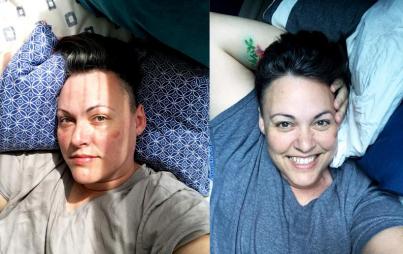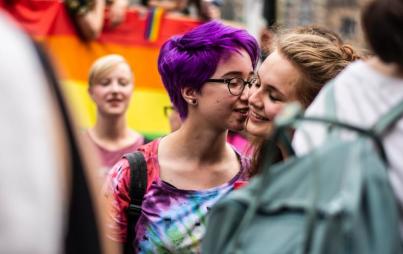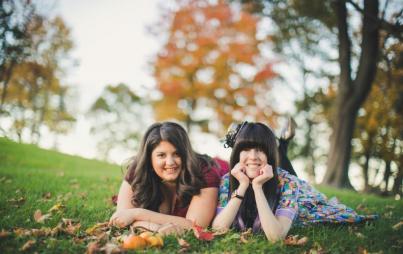
Read more stories from Ravishly's conversation series on police violence against women of color here. Have your own perspective to add? Email ravishly@ravishly.com.
#BlackWomensLivesMatter.
It’s a hashtag less often seen and a chant less often heard since Mike Brown was murdered by Ferguson police and Eric Garner was choked to death by NYPD officers while cameras rolled—although that’s changing, because Black women—who have always led movements against police violence—are insisting that our stories, too, become part of the national conversation around policing and safety.
The three Black women who coined the #BlackLivesMatter hashtag—Alicia Garza, Patrisse Cullors, and Opal Tometi—have affirmed over and over that it encompasses all Black lives—including Black women’s lives, queer and not queer, trans and not trans.
It’s an affirmation that is essential in the face of the reality that Black women’s lives have been consistently devalued and erased. Not only has taking our labor and our lives been part of business as usual throughout this country’s history, so has violating our bodies through systematic criminalization, physical brutality and sexual assault by law enforcement agents, from slave patrols to present day police.
What does it mean to say #BlackWomensLivesMatter? It means that when we talk about racial profiling, we talk about the fact that, as pointed out in a recent submission to the Presidential Task Force on 21st Century Policing endorsed by over 75 organizations and individuals:
Although racial profiling data reported by federal and state governments is rarely, if ever, disaggregated by race and sex, racial profiling studies which do analyze the experiences of women of color separately from those of men of color conclude that “for both men and women there is an identical pattern of stops by race/ethnicity.”

Saying #BlackWomensLivesMatter means remembering that police practices associated with the “war on drugs” continue to fuel the over 800% increase in the women's prison population since the 1980s.
These practices have proven deadly for women like Frankie Perkins, who, like Eric Garner, was choked to death by police. In her case they believed—erroneously it turned out—that she had swallowed drugs. They have diminished the life chances of so many other Black women in so many ways, including the loss of children and reproductive rights.
Saying #BlackWomensLivesMatter means remembering that “broken windows” policing practices that killed Eric Garner also contribute to the sweeping of countless Black women into the criminal legal system through profiling and discriminatory enforcement of prostitution-related offenses, often relying on the mere presence of condoms as evidence.
Saying #BlackWomensLivesMatter means that when we talk about police brutality, we remember that:
Black women and women of color also experience excessive force up to and including police shootings, including most recently Jessie Hernandez, a 16-year -old Latina killed by Denver police as this submission was being prepared, Aura Rosser, a 40-year-old Black woman killed by Ann Arbor police, and Tanisha Anderson, a 37-year-old Black woman killed by Cleveland police . . . In the weeks following Eric Garner’s killing in New York City, an NYPD officer put Rosan Miller, a Black 27-year-old, 5-month pregnant woman in a chokehold as they attempted to arrest her for grilling on the sidewalk, Denise Stewart, a Black grandmother who also had asthma was dragged naked into a hallway by officers who falsely assumed she was abusing her children, Stephanie Maldonado, perceived by NYPD officers to be queer, was thrown to the ground and beaten after being accused of jaywalking in the West Village, and another pregnant mother was thrown to the ground in Sunset park by NYPD officers who then used a TASER on her stomach. These are but a few examples of the excessive force to which women of color are submitted on a routine basis, and which must also be at the center of national debates surrounding police shootings and use of excessive force against people of color.
Saying #BlackWomensLivesMatter means remembering that perceptions of Black women rooted in slavery—animalistic, promiscuous, superhuman, violent and inviolable—are invisible in our conversations about profiling and targeting of Black men, but highly visible to officers enforcing racialized lines of gender and sexuality in police interactions, such that no matter how young, old, frail, or pregnant, Black women are often met with violence at the hands of police. Yet our names and experiences—even if caught on tape like Duanna Johnson’s—will rarely be the first to roll off the tongue or the presses.
It means that we need to pay as much attention to sexual violence by police officers like Daniel Holdsclaw, charged with raping eight Black women, as we do to physical brutality and shootings:
Although no official data currently exists, what research is available indicates that sexual harassment and assault of members of the public by police officers occurs with alarming frequency, yet the vast majority of departments have no policies or training in place explicitly addressing this issue.
[According to] the CATO Institute … Sexual assault and misconduct was the second most frequently reported form of police misconduct after excessive force...
Other studies found that up to 2 in 5 young women reported sexual harassment by law enforcement, and that young women of color, low income women, lesbian and transgender women, and otherwise marginalized women—as well as men and transgender people—are particularly vulnerable.
Saying #BlackWomensLivesMatter requires that when we think about responses to violence—be it domestic violence, sexual assault, or trafficking—we think of alternatives to police "protection" because Black women like Marissa Alexander (and particularly poor Black women, queer, trans and gender nonconforming Black women) are more often met with violence, arrest and indifference by police, rather than protection. An alarming number of police killings and assaults of Black women take place in the context of police responses to violence.
It is becoming increasingly commonplace to hear the names of Black women recited at #BlackLivesMatter actions, to see signs bearing their names and pictures held aloft, to see tweets calling attention to their cases, to see chapbooks, blogs, and Facebook posts telling their stories.
The challenge now is to further expand the conversation so that the solutions we advance to everything from profiling and police brutality, violence and safety, incorporate and fully address our experiences, and to ensure that our voices and experiences can never again be pushed to the margins of the movements we lead.







